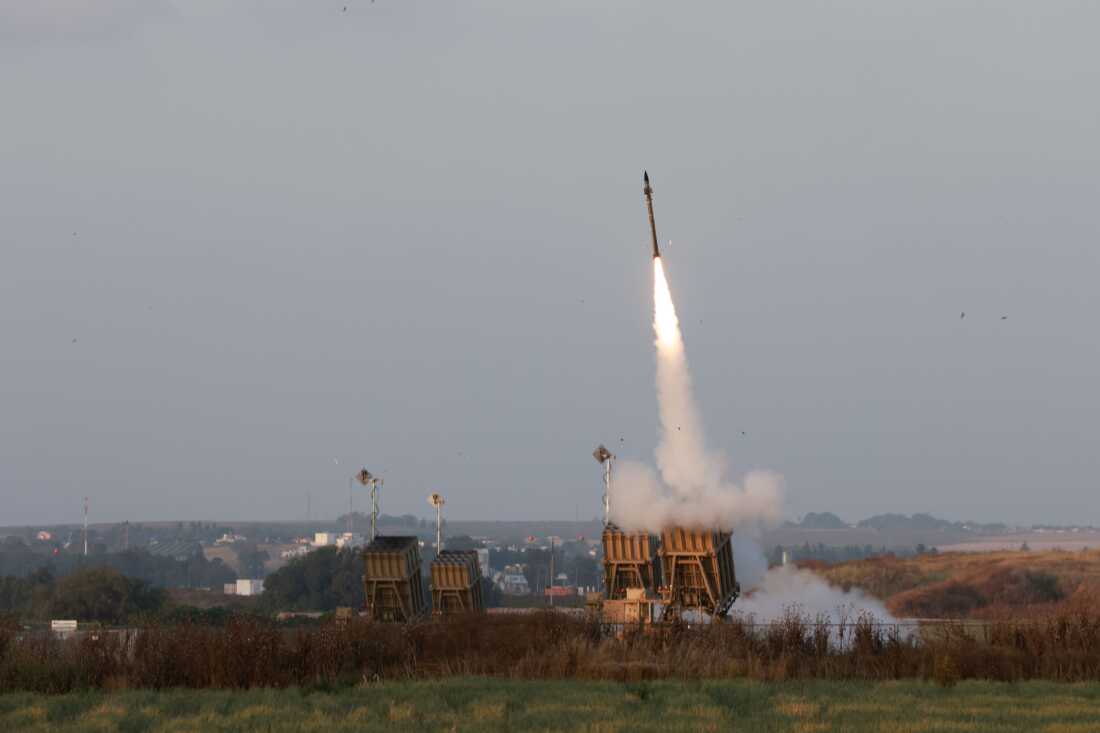
Israel's Iron Dome missile defense system (left) intercepts rockets (right) fired by Palestinian militants from Gaza on May 14, 2021. Over the years, Iron Dome has stopped thousands of rockets headed for Israeli cities, but experts warn that in a war with Hezbollah, new tactics and sheer numbers could cause it to fail. Anas Baba/AFP via Getty Images
Bibi, the inept "leader" of Israel, is leading his country into Little Big Horn territory with his disastrous genocidal treatment of Gaza and his total ignorance of how tech is changing the modern battlefield 24/7 with cheap drones able to overwhelm any defense system if enough of them are unleashed, something readily understood by anyone versed with how warfare is now being conducted in the year of our lord 2024. With this being said, Israel now has an existential crisis on its hands due to the far right government running things with arrogant and abject incompetence with no acknowledgement the Middle East is different now as seen by not only the rise of Hezbollah as a viable military force but also with the resilience of Hamas against the savage assault of Gaza begun by the Israelis after the surprise October 7th attack conducted by Hamas.
There are no winners here. A two state solution is the only way if both entities want to survive.
"The enemy knows very well that no place will be safe from our missiles and drones," Hezbollah's leader, Hassan Nasrallah, said on June 19.
Keeping those weapons from hitting Israeli territory is the job of a sophisticated air defense system called Iron Dome. It has intercepted thousands of missiles over the years, and it has been critical to protecting Israel's cities during the latest war in Gaza.
But some experts warn that Hezbollah's arsenal could push the system past its limits.
The Iranian-backed group has been conducting increasingly brazen attacks using exploding drones and low-flying missiles that Iron Dome has struggled to intercept. And last week, Hezbollah published a 10-minute-long surveillance video from an unmanned aerial vehicle that had slipped past multiple Iron Dome launchers. Among the sensitive locations it filmed was a secure manufacturing facility belonging to the Israeli defense firm Rafael — the company that makes the missile defense system.
The implication was clear: Hezbollah has Iron Dome in its sights. And this could be just a small taste of what's to come, says Tom Karako, director of the Missile Defense Project at the Center for Strategic and International Studies. Unlike the Palestinian group Hamas, Hezbollah is believed to have a large arsenal of precision-guided weapons that it could fire in a war with Israel.
"Look, there's not enough Iron Domes in the world to contend with the reported 100,000 or so rockets that Hezbollah may have," he warns.

Iron Dome is a network of high-powered radar, a targeting computer and missile launchers spread across Israel. It prioritizes incoming rockets, and it attempts to shoot them down only when they're headed for populated areas. Menahem Kahana/AFP via Getty Images
Iron Dome's an excellent system but ...
But Kalisky has been watching as the system has struggled to deal with Hezbollah's tactics. The group has been using anti-tank missiles, which fly low to the ground. The missiles, which can be fired only over short ranges, are too fast for Iron Dome to intercept, and they fly below the minimum altitude of the interceptor missiles.
Unmanned aerial vehicles (UAVs) also pose a problem for Iron Dome's radar, Kalisky says: The UAVs are made of carbon-based materials like wood and plastic that don't reflect radar as well as metal rockets do. "It's very difficult to detect them." Moreover, the border with Lebanon is home to a lot of birds that can be mistaken by the radar system for UAVs. "You have many, many false alarms," he says.
"To be honest, I think that Hezbollah recognized our gaps," says Zvika Haimovich, a retired brigadier general who oversaw Israel's air defenses from 2015 to 2018. "For that reason, they are using more and more UAVs in the last few weeks."
Tech never sleeps ...



No comments:
Post a Comment